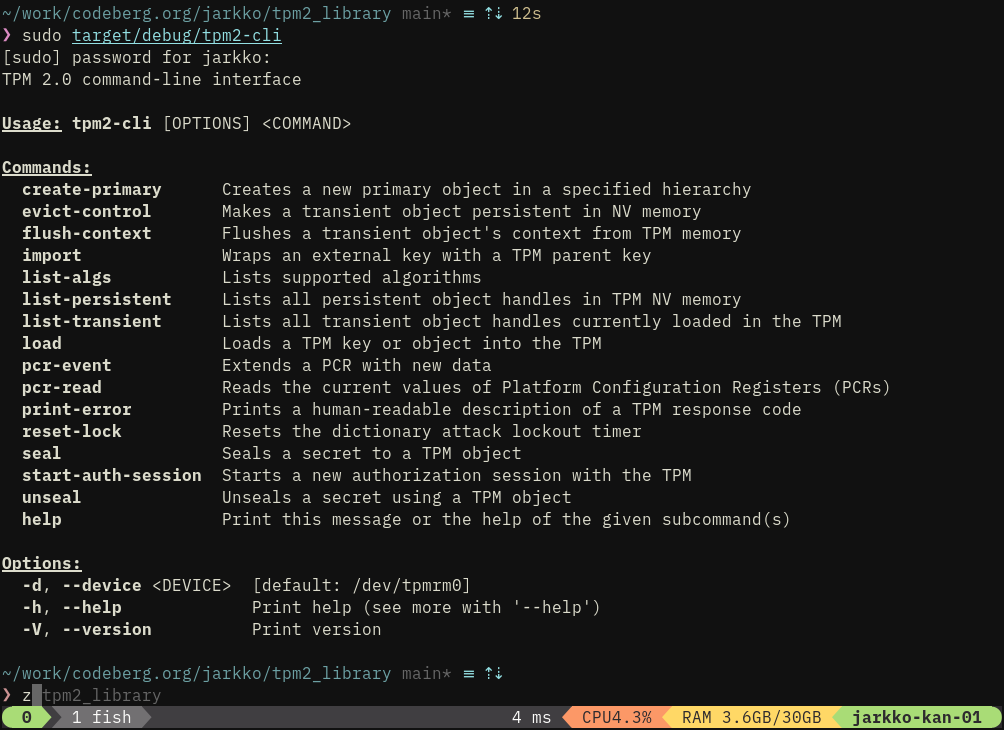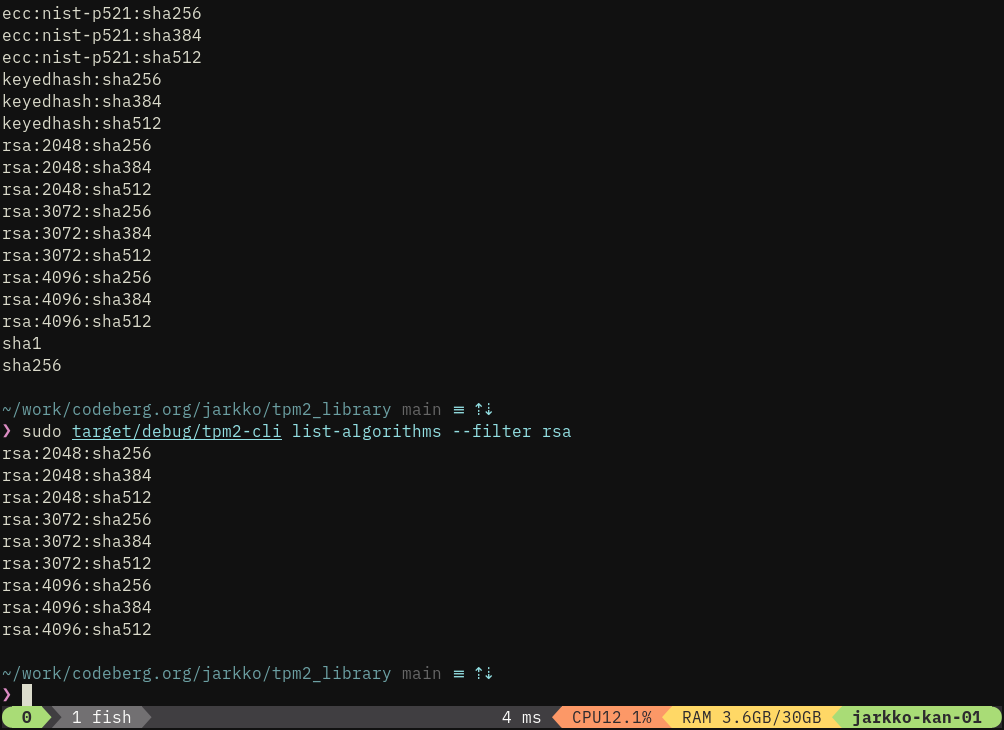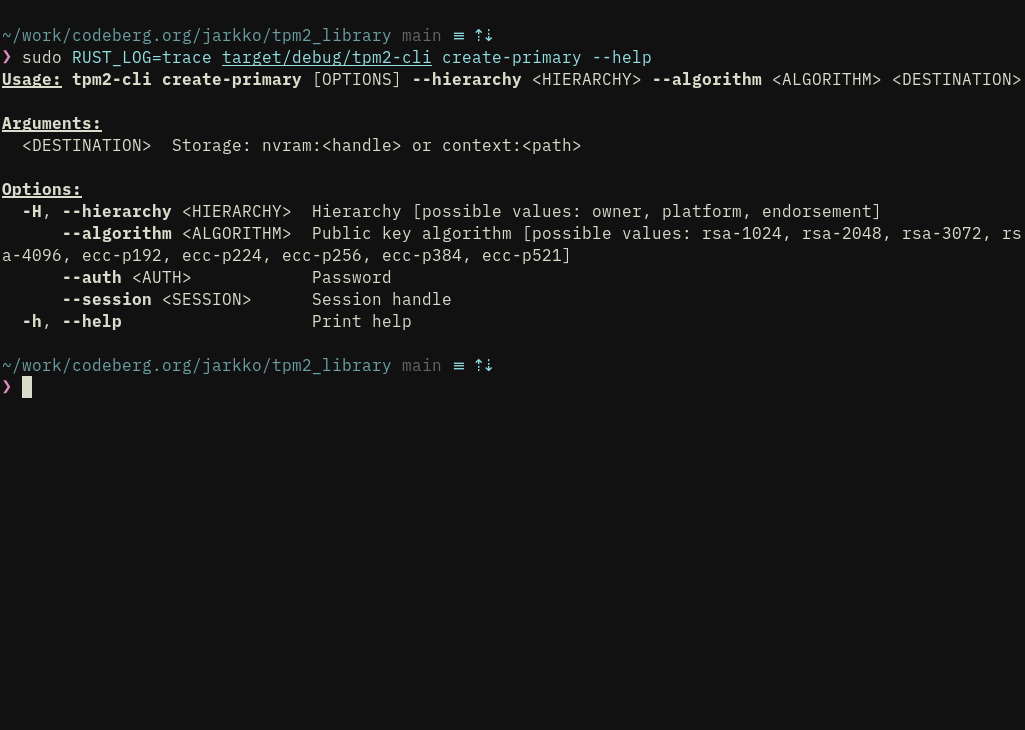Posts
5125Following
331Followers
506OpenPGP: 3AB05486C7752FE1
Jarkko Sakkinen
jarkkoWhen it starts to be easy to combine the subcommands in script this should be in fairly good state.
Import and load support keys in ASN.1 format, which is used by kernel for loading trusted keys. Software crypto for now is with libssl bindings as it is sort for safe-play for crypto (CVEs, security hotfixes, auditing) and also it is what I'm most used to in kernel development (and that is what I ultimately care about).
Jarkko Sakkinen
jarkkoThis is how I declare command bodies now in the implementation:
tpm_command!(
TpmStartAuthSessionCommand,
TpmCc::StartAuthSession,
TpmSt::NoSessions,
2,
pub nonce_caller: Tpm2b,
pub encrypted_salt: Tpm2b,
pub session_type: TpmSe,
pub symmetric: TpmtSymDefObject,
pub auth_hash: TpmAlgId,
);
[2 is in fact number handles]
This will generate the command and implement traits for marshalling AND unmarshalling command. Both are implemented in-depth for all TCG specification types across the board.
Another simpler example is TPML_* from the specification:
tpml!(TpmlAlgProperty, TpmsAlgProperty);
tpml!(TpmlDigest, Tpm2b);
tpml!(TpmlDigestValues, TpmtHa);
tpml!(TpmlHandle, u32);
tpml!(TpmlPcrSelection, TpmsPcrSelection);
And TPM2B_*:
tpm2b!(full; Tpm2bAttest, TpmsAttest);
tpm2b!(full; Tpm2bContextData, TpmsContextData);
tpm2b!(full; Tpm2bCreationData, TpmsCreationData);
tpm2b!(full; Tpm2bEccPoint, TpmsEccPoint);
tpm2b!(full; Tpm2bEncryptedSecret, TpmuEncryptedSecret);
tpm2b!(full; Tpm2bIdObject, TpmsIdObject);
tpm2b!(full; Tpm2bNvPublic, TpmsNvPublic);
tpm2b!(full; Tpm2bSensitive, TpmtSensitive);
tpm2b!(full; Tpm2bTemplate, TpmtPublic);
I find this really fascinating :-)
#rust #rustlang #linux #kernel #tpm
Jarkko Sakkinen
jarkkoit's about 5k of rust code but large portion of that is just architectural types.
the first problem is the hardest: what to call the new at this point still imaginary device :-)
it's a post initcall use case just like /dev/tpmrm0 e..g, use by systemd (afaik tbh have not checked) where as hardware interfacing stuff would be tedious given tight bindings to to the boot. thus, it is not extremely hard to implement in linux-rust as long as the device can turn on before PID 1.
benefits could be e.g., to simplify TPM code in daemons such as systemd, if the resource manager would do a better job servicing their requirements.
#linux #tpm #rust #rustlang
Jarkko Sakkinen
jarkkoSome other idioms are context: and nvram: as sinks for output.
Jarkko Sakkinen
jarkkoJarkko Sakkinen
jarkkopub trait Command<'a>: Marshal + Unmarshal<'a> {
const COMMAND_CODE: TpmCc;
const COMMAND_TAG: TpmSt;
}
pub trait Response<'a>: Marshal + Unmarshal<'a> {
const COMMAND_CODE: TpmCc;
const COMMAND_TAG: TpmSt;
}
Jarkko Sakkinen
jarkko1. It's a no_std crate that uses Rust's type system describe TPM commands and responses in the same resolution as the spec.
2. It marshals also responses and unmarshals commands.
3. It's not a stack. it's stackless implementation of types.
These properties allow to nest and glue it to TSS2 and any other pre-existing TPM stack.
Also it could be theoretically used to implement a chip since it is designed to run also bare metal and has been designed to be skimpy on resources ;-)
Hopefully next week get this out...
Jarkko Sakkinen
jarkko```
creation_ticket.rs
mod.rs
tpm2b_public.rs
tpm2b.rs
tpm2b_sensitive_create.rs
tpm_alg_id.rs
tpma_object.rs
tpma_session.rs
tpm_cap.rs
tpm_cc.rs
tpm_ecc_curve.rs
tpml_digest.rs
tpml_digest_values.rs
tpml_pcr_selection.rs
tpm_rc.rs
tpm_rh.rs
tpms_auth_command.rs
tpms_auth_response.rs
tpms_context.rs
tpms_ecc_point.rs
tpm_se.rs
tpms_keyedhash_parms.rs
tpms_pcr_selection.rs
tpms_pcr_select.rs
tpms_sensitive_create.rs
tpms_symcipher_parms.rs
tpm_st.rs
tpmt_ha.rs
tpmt_kdf_scheme.rs
tpmt_public.rs
tpmt_scheme.rs
tpmt_sym_def_object.rs
tpmu_ha.rs
tpmu_public_id.rs
tpmu_public_parms.rs
```
This is horribly slow process as first because it is not as mechanical process one might think. There's lot of scattered per-type quirks. But as this grows this becomes less and less of pain :-)
I define "completed" status for every type that they must serialize and deserialize, which creates constraints that make them feasible for mock testing for instance.
Jarkko Sakkinen
jarkko❯ sudo RUST_LOG=trace target/debug/tpm2-cli create-primary -H owner ecc --curve nist-p256
2025-08-05T07:51:22.223171Z DEBUG tpm2_cli::tpm: Opening device: /dev/tpmrm0
2025-08-05T07:51:22.223258Z TRACE tpm2_cli::tpm: Command:
2025-08-05T07:51:22.223283Z TRACE tpm2_cli::tpm: 0000: 80 02 00 00 00 43 00 00 01 31 40 00 00 01 00 00
2025-08-05T07:51:22.223298Z TRACE tpm2_cli::tpm: 0010: 00 09 40 00 00 09 00 00 00 00 00 00 04 00 00 00
2025-08-05T07:51:22.223310Z TRACE tpm2_cli::tpm: 0020: 00 00 1a 00 23 00 0b 00 03 00 72 00 00 00 06 00
2025-08-05T07:51:22.223326Z TRACE tpm2_cli::tpm: 0030: 80 00 43 00 10 00 03 00 10 00 00 00 00 00 00 00
2025-08-05T07:51:22.223335Z TRACE tpm2_cli::tpm: 0040: 00 00 00
2025-08-05T07:51:22.467218Z TRACE tpm2_cli::tpm: Response Header:
2025-08-05T07:51:22.467308Z TRACE tpm2_cli::tpm: 0000: 80 02 00 00 01 1a 00 00 00 00
2025-08-05T07:51:22.467332Z TRACE tpm2_cli::tpm: Response Body:
2025-08-05T07:51:22.467363Z TRACE tpm2_cli::tpm: 0000: 80 ff ff ff 00 00 01 03 00 5a 00 23 00 0b 00 03
2025-08-05T07:51:22.467393Z TRACE tpm2_cli::tpm: 0010: 00 72 00 00 00 06 00 80 00 43 00 10 00 03 00 10
2025-08-05T07:51:22.467421Z TRACE tpm2_cli::tpm: 0020: 00 20 a7 a6 81 0c 1c 1e 49 00 6f 24 69 12 22 e5
2025-08-05T07:51:22.467455Z TRACE tpm2_cli::tpm: 0030: af 6f 2a 47 65 ed 8e 68 4a 9f 16 e9 03 db 5a 42
2025-08-05T07:51:22.467485Z TRACE tpm2_cli::tpm: 0040: 5c 0a 00 20 57 7c e3 94 59 4c ab 5b 46 49 32 9a
2025-08-05T07:51:22.467516Z TRACE tpm2_cli::tpm: 0050: be 04 e9 9e 8f 21 6d 3d 86 53 42 c3 48 20 40 dd
2025-08-05T07:51:22.467545Z TRACE tpm2_cli::tpm: 0060: fc 83 95 f2 00 37 00 00 00 00 00 20 e3 b0 c4 42
2025-08-05T07:51:22.467572Z TRACE tpm2_cli::tpm: 0070: 98 fc 1c 14 9a fb f4 c8 99 6f b9 24 27 ae 41 e4
2025-08-05T07:51:22.467600Z TRACE tpm2_cli::tpm: 0080: 64 9b 93 4c a4 95 99 1b 78 52 b8 55 01 00 10 00
2025-08-05T07:51:22.467631Z TRACE tpm2_cli::tpm: 0090: 04 40 00 00 01 00 04 40 00 00 01 00 00 00 20 5d
2025-08-05T07:51:22.467661Z TRACE tpm2_cli::tpm: 00a0: a0 41 ba c0 ee 31 35 ae bb 0c ad fb a4 97 c6 a1
2025-08-05T07:51:22.467690Z TRACE tpm2_cli::tpm: 00b0: 87 7f ae 83 2d d3 d1 f8 f7 a8 71 b8 25 e8 54 80
2025-08-05T07:51:22.467720Z TRACE tpm2_cli::tpm: 00c0: 21 40 00 00 01 00 20 52 97 3a e0 e3 f0 a2 4e a3
2025-08-05T07:51:22.467750Z TRACE tpm2_cli::tpm: 00d0: 49 de 48 4c 75 d3 5d b8 ea b7 d3 d6 e2 f9 63 22
2025-08-05T07:51:22.467780Z TRACE tpm2_cli::tpm: 00e0: 73 f5 bb db 1b ae 84 00 22 00 0b 82 79 ad e2 be
2025-08-05T07:51:22.467809Z TRACE tpm2_cli::tpm: 00f0: 16 9a 3c b5 20 69 67 97 1b ee 93 bc be c8 fe d3
2025-08-05T07:51:22.467840Z TRACE tpm2_cli::tpm: 0100: cc b4 e6 bd 02 0a 69 48 d7 23 dc 00 00 01 00 00
0x80ffffff
❯ sudo target/debug/tpm2-cli create-primary -H owner ecc --curve nist-p256
0x80ffffff
❯ sudo target/debug/tpm2-cli create-primary -H owner --export-file primary.ctx ecc --curve nist-p256
I'll still need to check that this at least can feature wise in par with tpm2-scripts (mainly cphash functionality) and that tpm2_protocol does not have immediate glitches when implementing features to tpm2-cli. Also since tpm2_protocol is Apache/MIT and tpm2_cli I add a bit features to make sure that right parts
of the code are in the "correct basket".
I'm also looking into if I could make TPM protocol assets fit into the constrainsts of bincode and serde, and since it is looking good I finish this feature too.
Sunday I got there feature-wise but only at the end realized I was creating a wrong thing. Now I prepare the code base a bit, test etc. and the I put this to Gitlab :-)
#tpm #linux
Jarkko Sakkinen
jarkkoprotocol
├── Cargo.toml
└── src
├── envelope
│ ├── create_primary_command.rs
│ ├── create_primary_response.rs
│ ├── create_response.rs
│ ├── dictionary_attack_lock_reset_command.rs
│ ├── empty_response.rs
│ ├── flush_context_command.rs
│ ├── get_capability_command.rs
│ ├── get_capability_response.rs
│ └── mod.rs
├── lib.rs
├── object
│ ├── creation_ticket.rs
│ ├── mod.rs
│ ├── tpm2b_data.rs
│ ├── tpm_alg_id.rs
│ ├── tpma_object.rs
│ ├── tpml_pcr_selection.rs
│ ├── tpms_sensitive_create.rs
│ └── tpmt_public.rs
and further:
1. object "registry" is a flat and fat given that there is standard body doing "intelligent hashing", i.e. TCG is my UUID algorithm for that directory. agreed that the de-facto names are ugly but it is ugly AND clean :-) it is known to scale with the spec from the get go to foreseeable future making it ugly, clean and super stable.
2. all objects marshal and unmarshhal.
3. envelope is also flat as i have unidirectionality as constraint and both commands and responses translate bytestream and back.
this api is aimed to work for clients and emulators. i have no interest to write a simulator but it's still easy to figure out how to make that useful: the same crate can be used to implement TPM interaction and tests can use it to mock the TPM chip interaction :-)
[and it will appear to gitlab anytime soon]
#tpm #linux #tss
Jarkko Sakkinen
jarkkoI’m finally updating tpm2_library crates which provide near spec idiomatic naming balanced with Rust conventions, marshalling/unmarshalling, parsing displaying error codes with parameter numbers etc.
The protocol crate is aiming to be no_std style IO free crate. In fact I aim to polish it to the level that it would be equally useful and complete for both clients and TPM emulators to take advantage of and given the use purpose having super-conservative list of deps:
[dependencies] bitflags = { workspace = true } strum = { workspace = true } strum_macros = { workspace = true }
The idea how naming goes is easiest to demostrate with TPM_CC type form TPM2 Structures specification. Let’s randomly pick TPM_CC_EvictControl, which is use for transient-persistent and persistent-evicted conversions.
EDIT: So, uhm, I’ll setting it up the project to Gitlab. Was doing too many things at once :-) I moved the repo away from Codeberg some weeks ago to get more CI quota basically but Github was not the right move. Gitlab is a better fit because I already do kernel CI there, keyutils is hosted in Gitlab and I’ve had less luck running actions locally with “act” than “gitlab-ci-local” (https://github.com/firecow/gitlab-ci-local).
I have already placeholder for it in Gitlab but it is probably better sleep first and do after (and make sure that everything works).
[*] https://github.com/ColinIanKing/tpm2-scripts Thanks for @colinianking again for preservation! It came for use now …
Jarkko Sakkinen
jarkkoJarkko Sakkinen
jarkkoJarkko Sakkinen
jarkkoThis is a fish function:
function cargo-registry --argument-names query
set -l r \
~/.cargo/registry/src/index.crates.io-*/
set -l c (
ls -d $r*/ 2>/dev/null \
| xargs -n 1 basename
)
if test -z "$query"
printf '%s\n' $c \
| sort
else
printf '%s\n' $c \
| grep -i "$query" \
| sort
end
end
And what it does is:
❯ cargo-registry|head
ab_glyph_rasterizer-0.1.9
ab_glyph-0.2.31
accesskit_consumer-0.28.0
accesskit_macos-0.20.0
accesskit_winit-0.27.0
accesskit-0.19.0
adler2-2.0.1
adler2-2.0.1
ahash-0.8.12
ahash-0.8.12
aho-corasick-1.1.3
allocator-api2-0.2.21
allocator-api2-0.2.21
anstream-0.6.19
anstream-0.6.19
anstyle-1.0.11
anstyle-1.0.11
anstyle-parse-0.2.7
anstyle-parse-0.2.7
anstyle-query-1.1.3
# ...
And also:
❯ cargo-registry egui
egui_glow-0.32.0
egui-0.32.0
egui-wgpu-0.32.0
egui-winit-0.32.0
Jarkko Sakkinen
jarkkomakes is so much less involved
Jarkko Sakkinen
jarkkoE.g., a librarian for USB mass storage would have to base identifying to filesystem labels, and obviously user would have to have a process for labeling for that to actually work.
And if a malicious stick is attached, as long as it provides sane description of itself (i.e. naming a legit device, vendor, class etc.), computer can't tell the difference.
Jarkko Sakkinen
jarkkoThis is as done as lsiommu can ever be, or at least as far as I’m concerned so it’s a release time:
https://github.com/puavo-org/lsiommu/releases/tag/1.0.0
I.e. I spent last night making it do less from the almost nothing it was doing already ;-) That’s the point of these tools…
That enumerated to:
- Reverted back to heap sort.
- Carved 64 kB of data section for JSON builder.
- Hammered STRING_BUFFER() to migrate most of the strings to stack (except JSON builder
- Bunch of fixes…
This sums up to zero mallocs from the main application (while libudev probably does bunch of them when not compiled with make DISCOVER=sysfs).
Motivation to do was this shitty python script:
#!/usr/bin/env python3
#
# Copyright (c) 2022-2023 Jarkko Sakkinen <jarkko.sakkinen@iki.fi>
import os
import sys
IOMMU_SYSFS = '/sys/kernel/iommu_groups'
IOMMU_GROUP_MAX = 128 # an arbitrary choice
def get_iommu_devices():
groups = [None for group in range(IOMMU_GROUP_MAX)]
with os.scandir(IOMMU_SYSFS) as group_it:
for group in group_it:
devices = []
group_sysfs = IOMMU_SYSFS + '/' + group.name + '/devices'
with os.scandir(group_sysfs) as device_it:
for device in device_it:
devices.append(device.name)
index = int(group.name)
if index >= IOMMU_GROUP_MAX:
print('Overflow')
sys.exit(1)
groups[index] = devices
return groups
if __name__ == "__main__":
groups = get_iommu_devices()
for i in range(len(groups)):
group = groups[i]
if group == None:
break
print('IOMMU Group %d' % (i))
group.sort()
for device in group:
# FIXME: Replace with pure Python code:
os.system('lspci -nns ' + device)
Jarkko Sakkinen
jarkkohttps://codeberg.org/jarkko/mailweb/issues
I could easily cope with approaches if it makes sense to me. I just wrote, mainly as a reminder, steps to a working implementation done if I really had to :-)
Jarkko Sakkinen
jarkkoWith "--browse" it just forwards the result to the mime handler.


